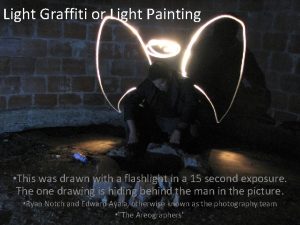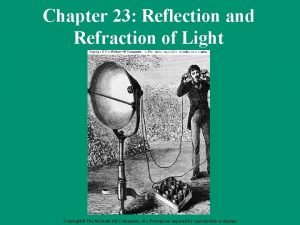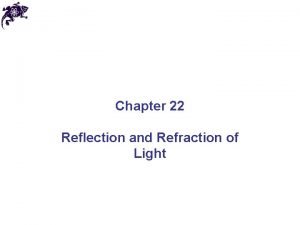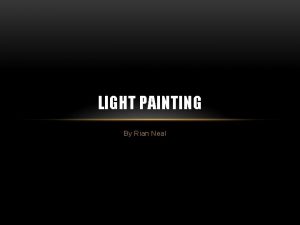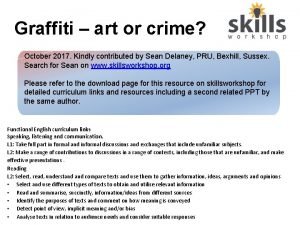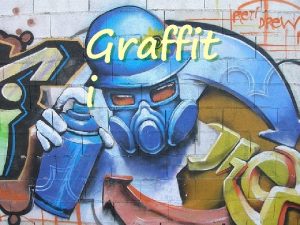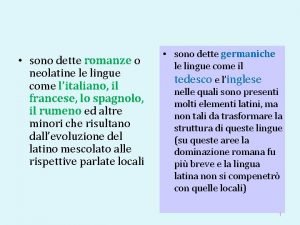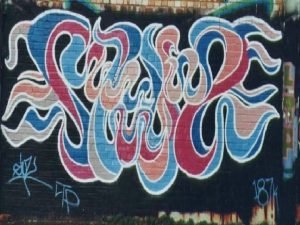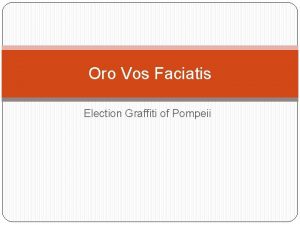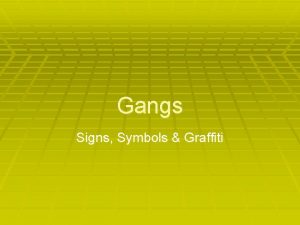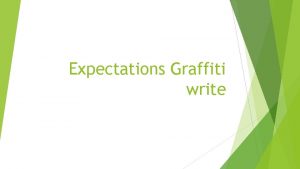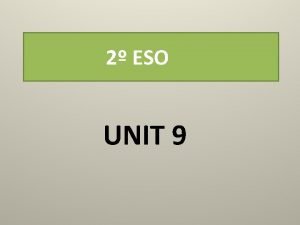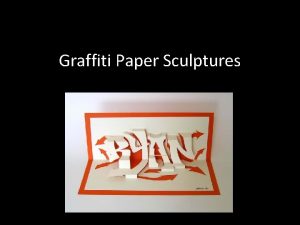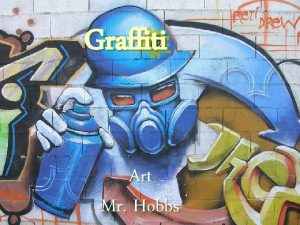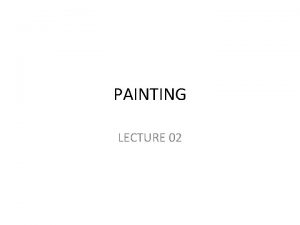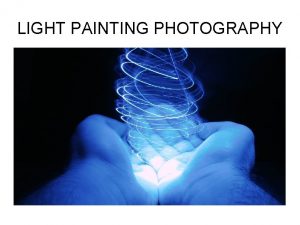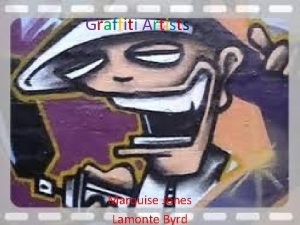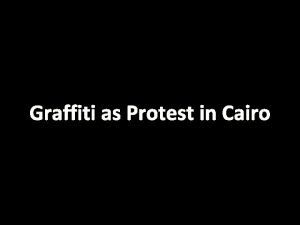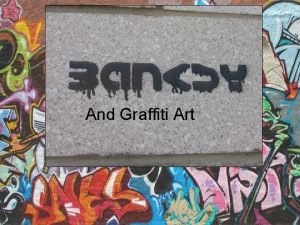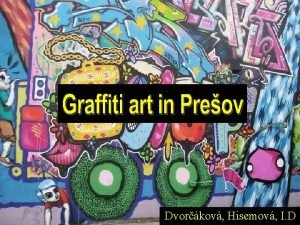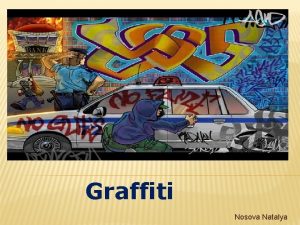Light Graffiti or Light Painting This was drawn















- Slides: 15

Light Graffiti or Light Painting • This was drawn with a flashlight in a 15 second exposure. The one drawing is hiding behind the man in the picture. • Ryan Notch and Edward Ayala, otherwise known as the photography team • "The Areographers"

Light Graffiti or Light Painting Light graffiti, also known as light drawing or light painting, is a photographic technique in which exposures are made usually at night or in a darkened room by moving a hand-held light source or by moving the camera. http: //www. thinkcamera. com/news/article. asp? UAN=509 exposure is the total density of light allowed to fall on the photographic medium (photographic film or image sensor) during the process of taking a photograph. Example of light painting moving the camera

Light Graffiti or Light Painting The first known photographer to use this technique was Man Ray in his series "Space Writing" created in 1935. Man Ray (August 27, 1890 – November 18, 1976), an American artist who spent most of his career in Paris, France. He was a significant contributor to both the Dada and Surrealist movements. Best known in the art world for his avant-garde photography, Man Ray produced major works in a variety of media and considered himself a painter above all. He was also a renowned fashion and portrait photo grapher. He is noted for his photograms.

Light Graffiti or Light Painting Man Ray: Untitled (Space Writing), 1939

Light Graffiti or Light Painting Pablo Picasso’s Light Drawings Picasso Draws a Centaur

Moving the Light Source The light can either be used to selectively illuminate parts of the subject or to "paint" a picture by shining it directly into the camera lens. Light painting requires a sufficiently slow shutter speed, usually a second or more. Like night photography, it has grown in popularity since the advent of digital cameras because they allow photographers to see the results of their work immediately. Light painting can take on the characteristics of a quick pencil sketch. Jacques Kohler

ISO Photographers use a low ISO setting on a digital sensor to minimize grain (or digital noise) and increase exposure tolerance. In a film camera ISO is the ‘speed’ of the film – higher ISO values mean you can take photos in lower light. In a digital camera ISO indicates your sensitivity to light. The higher the number, the less light is needed to take a photo that is correctly exposed (not too dark or too light). http: //www. hdslr-cinema. com/news/shooting/camera-shootout-at-very-high-iso/

Summary Aperture is also an important variable in light painting. Smaller apertures such as f 16 or f 22 generate a sharper image and preserve a large depth of field, creating deep focus. This technique requires longer exposure times but creates interesting results. Larger apertures such as f 5. 6 or f 2. 8 often blur the lines drawn by a light pen or LED source.

Summary In digital photography exposure is the total density of light allowed to fall on the photographic medium image sensor when taking a photograph. Light painting requires a sufficiently slow shutter speed, usually a second or more. Shutter speed is a common term used to discuss exposure time, the length of time a camera's shutter is open. A tripod is usually necessary due to the long exposure times involved. Alternatively, the camera may be placed on or braced against a table or other solid support. The higher the ISO number, the less light is needed to take a photo that is correctly exposed (not too dark or too light). Smaller apertures such as f 16 or f 22 generate a sharper image and preserve a large depth of field, creating deep focus. FOR EXAMPLE: ISO: 200 / NR: 15” (noise reduction) / F: 6. 3 (a larger aperture) These are the current settings for Mr. Simpsons camera / your first light graffiti photo NR: 15” gave me 12 seconds, NR: 13” gave me 10 seconds, NR: 10 gave me 8 seconds

Light Painting Tutorial Video http: //www. youtube. com/watch? v=4 IS-DBZEXc. A Tony teaches you how to do some cool stuff with your camera in this video lesson. This was awesomefarm's entry in the mindbites. com "spread the craft" video contest, where we won the viewer's choice award.

So many options. . . Simple paper over a flashlight will give you this effect. New techniques DECEMBER 5, 2008 DAVID WILHELM

Research notes: • Fill 2 pages (minimum) in your sketchbook / file of light graffiti research • Display the images you are most interested in and that will help you generate ideas • Display the photos in an interesting way • Make notes under each photograph • What emotions does this work bring to mind? • How do you think they made this image? What did they use? • What attracted you to this image above thousands of others? • What would you like to try as a result of seeing this photograph? • What puzzles you what questions do you have?

Use at least two locations for this assignment, 1 indoor and 1 outdoor. You will end with a total of five final photographs. At least two in each location (3 in one, 2 in the other) Remember that your shutter will be open for a long time so it can't be that bright. For all assignments: Make sure that you think about positioning your models/objects along the Z axis. The X axis being the width of the image, the Y axis being the height of the image, and the Z axis being the depth of the image. Assignment 1: Create a composition by highlighting details within the frame of the camera with the flashlight. Include 2 people, or a person and an object. One (or both) of these things should be 'altered with light'. You can use light to make them transparent, drawn on or around them with light, or have them draw in the air with light. Assignment 2: 1. Create a 3 D drawing in air using a laser pointer, LED, or LED flashlight. Try and re-create a space in your house (or other dark indoor location) with objects and 'things' created out of light. Remember that things closer to the camera should appear drawn bigger than things away from the camera. Assignment 3: One person in your photograph is painted in a number of different locations in the same photograph. This should include some suggestions of difference - emotions, positions, etc. Assignment 4: Abstraction. Using lights, create an abstract composition. YES- this may have realistic elements in it (people, objects, etc). Assignment 5: Include a person or object and a single line or simulated brush stroke. Assignment 6: Free choice.

Assignment 1: Create a composition by highlighting details within the frame of the camera with the flashlight. Include 2 people, or a person and an object. One (or both) of these things should be 'altered with light'. You can use light to make them transparent, drawn on or around them with light, or have them draw in the air with light. Assignment 2: Create a 3 D drawing in air using a laser pointer, LED, or LED flashlight. Try and re-create a space in your house (or other dark indoor location) with objects and 'things' created out of light. Remember that things closer to the camera should appear drawn bigger than things away from the camera. Assignment 3: One person in your photograph is painted in a number of different locations in the same photograph. This should include some suggestions of difference - emotions, positions, etc. Assignment 4: Abstraction. Using lights, create an abstract composition. YES- this may have realistic elements in it (people, objects, etc). Assignment 5: Include a person or object and a single line or simulated brush stroke. Assignment 6: Free choice.

Making driving beautiful | 2012 VW Jetta GLI TV commercial September 2011 • http: //www. youtube. com/watch? v=Fd. C 31 gm r. YHA The making of: • http: //www. youtube. com/watch? feature=iv& src_vid=Fd. C 31 gmr. YHA&v=l. SV 5 w. K 1 Gz. HA&ann otation_id=annotation_987266
 Light graffiti photography
Light graffiti photography Light light light chapter 23
Light light light chapter 23 Light light light chapter 22
Light light light chapter 22 Light light light chapter 22
Light light light chapter 22 Glow stick light painting
Glow stick light painting Is graffiti art or crime
Is graffiti art or crime I graffiti
I graffiti Graffiti pompeiani latino volgare
Graffiti pompeiani latino volgare The word graffiti
The word graffiti Faciatis
Faciatis 2 1 gang sign
2 1 gang sign Llama plural
Llama plural Is graffiti art or crime
Is graffiti art or crime Saang aspeto nagkakaiba at nagkakatulad ang mga kontinente
Saang aspeto nagkakaiba at nagkakatulad ang mga kontinente Expectations graffiti
Expectations graffiti Graffiti countable or uncountable
Graffiti countable or uncountable
